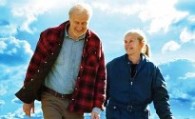No Other Land, a film about the Palestinian struggle against Israel’s occupation of the West Bank, has been met with worldwide critical acclaim, multiple film festival awards, and finally the Academy Award for best documentary feature. And yet no mainstream distributor in the U.S. was willing to take it on, a fact that should sound an alarm about political pressure in the film industry. It’s finally showing in America now because of two small independent media companies that are offering it to art theaters on request.
Basel Adra is a young Palestinian activist from Massafer Yata, a group of ancient villages in the mountains of the southern West Bank. We learn in voice-over how as a child he saw his father protesting the treatment of his community by the Israeli Army. In 2002, the Supreme Court of Israel ruled that the Army was allowed to destroy these villages, expel their inhabitants, and turn the land into a military training area. A series of lengthy legal battles staved off the threat, but in 2018, the army finally got past the challenges and began its work in earnest. Basel started filming the soldiers and their interactions with the protesting villagers, at some personal risk, and then hiding the footage in safe keeping.
In 2019 he befriended a young Israeli journalist, Yuval Abraham, who started covering the story as an ally. They decided, along with two others—a Palestinian cinematographer and an Israeli one—to document the events in a film. It was an arduous five-year task, showing, as clearly as one could desire, the nature of what the Israeli government is doing. We see the soldiers arrive, tell people they have to leave their homes, that they’re on the army’s land, while the villagers yell and get pushed down and threatened with guns. Then bulldozers destroy a home, with residents only able to grab whatever belongings they can carry.
Palestinians have lived on this land for centuries. After the demolitions, the people retreat to sparsely furnished underground caves, where they make do until the army leaves, and then return above ground and start rebuilding at night. No Other Land shows us week after week, year after year, this agonizing destruction of their homes, and their children’s school. The protests sometimes lead to shootings of unarmed people—one young man is paralyzed from the neck down after being shot.
In counterpoint to this constantly stressful situation, the film gives us some quiet moments with people sharing their experiences, and a deepening friendship between Basel and Yuval. They’re able to be brutally honest with one another. Basel emphasizes how Yuval can drive to his home in Israel without hindrance, while he is forced to stay under the occupation.
The effect of all this footage showing directly the cruelty and barbaric behavior of the army, and the Israeli settlers who come in masks with their guns and clubs to expel people and take all the stolen land for themselves, has a devastating effect. We get to see firsthand what in fact had been going on for decades. The excuses that justify the settlements, and claim legitimacy for an apartheid system, fall apart when you see the events up close. No Other Land is a milestone in our understanding of the urgent need for Palestinian liberation.

John Cassavetes’ acclaimed film from 1974 features Gena Rowlands in the title role as a woman who can’t fit into the narrow role of...

In a youth-obsessed culture, older people don’t get to play the main characters in movies too often. Still Mine, a Canadian film written and...

Renée Zellweger gives a stunning performance as Judy Garland in the last year of her life, performing in London while suffering from the drug...